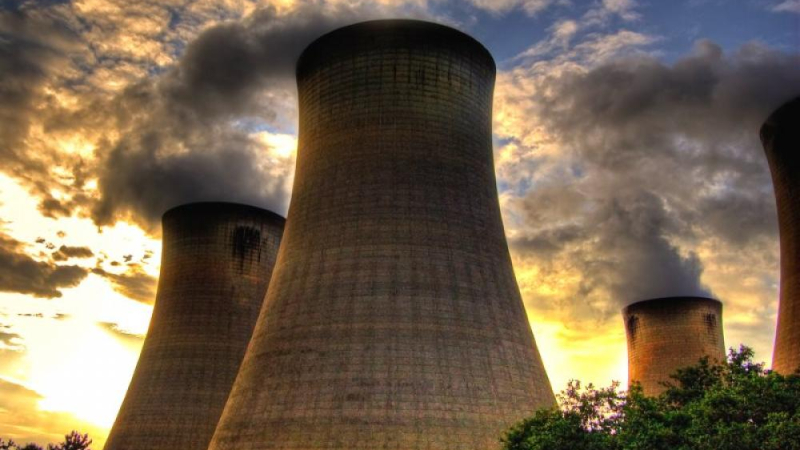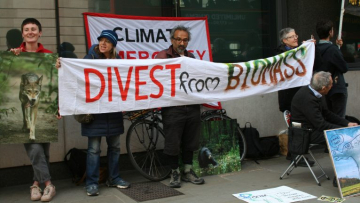Project – On record
This profile is no longer actively maintained, with the information now possibly out of dateFrances Howe, Biofuelwatch UK, (+44) 792 811 3194

Project – On record
This profile is no longer actively maintained, with the information now possibly out of dateFrances Howe, Biofuelwatch UK, (+44) 792 811 3194
Why this profile?
The UK government has committed to phasing out coal by 2025. It is vital that, in this phase out, coal is not simply replaced with gas, another fossil fuel, or biomass, which at this scale will have disastrous consequences for the climate and biodiversity. Converting Drax Power Station from coal to gas will lock the UK into another generation of fossil fuel dependence.
What must happen
Banks should not invest in a project that is so harmful to the climate, biodiversity and communities. To have any chance of staying below 1.5 degrees of global warming, we need a massive reduction in our energy demand and a widespread switch to no-burn renewables – not an expansion of polluting fossil fuels. Instead of converting to other forms of polluting power, Drax needs to be shut down and replaced with genuine renewable alternatives.
| Sectors | Gas Electric Power Generation |
| Location |
|
| Status |
Cancelled
Design
Agreement
Construction
Operation
Closure
Decommission
|
| Website | http://repower.drax.com/ |
The Drax Repower project is a proposed partial rebuilding of the existing Drax Power Station (run by Drax plc) which runs on biomass and coal. The proposal is to rebuild its final two coal-burning units to run on gas instead of coal. This will follow the conversion of the other four units to run on biomass from imported wood. If the project goes ahead Drax Power Station will become the UK’s largest gas-fired power station, with a capacity of 3.6 gigawatts, as well as the world’s largest biomass burner.
Social and human rights impacts
The majority of the wood pellets that provide fuel for Drax's biomass units (59%) are sourced from biodiverse forests in the southern United States. The pellet mills have a large impact on the local communities -besides the loss of local forests- through air pollution, wood dust, noise and heavy traffic. Wood pellet production facilities release fine particulates, nitrogen oxides, carbon monoxide, and volatile organic compounds in the air. Pellet mills and export facilities are often located in poor, largely African-American, neighbourhoods, contributing to existing environmental injustice.
A recent study by the Environmental Integrity Project discovered that wood pellet facilities in the US regularly breach air quality legislation, with over half of wood pellet plants either failing to keep emissions below legal limits or failing to install required pollution controls. One third had violated their permits in 2017 by releasing illegal amounts of air pollution. As the largest single customer of wood pellets from the region, Drax is contributing to this pattern of environmental negligence and its consequent impacts on public health.
Environmental and climate impacts
Impacts of the gas units Although the Drax Repower project involves a shift from coal to gas, it will lead to an expansion of the power station’s capacity and its greenhouse gas emissions. Drax admits in its Preliminary Environmental Information Report that the conversion of burning gas at the power station will “represent a significant net increase in greenhouse gas emissions and have therefore negative climate impacts." This is likely to mean Drax will remain the UK’s single largest emitter of carbon dioxide.
Although fossil fuel gas emits less air pollutants and CO2 than coal, it is far from clean. Studies suggest that it may have the same level of greenhouse gas emissions as coal once methane leakage from pipelines and wells are factored in. Drax has said the new units will be ‘carbon capture ready’, however there are no clear plans to capture carbon. Building new gas power capacity is likely to drive demand for fracking, a highly polluting and unpopular process.
The Paris Climate Agreement countries have committed to curbing temperature rises to "well below" 2C above pre-industrial levels and to pursue efforts to keep them to 1.5C to prevent dangerous climate change. New fossil fuel based power generation projects like Drax Repower are incompatible with this target.
Drax’s plan to replace coal with another fossil fuel is contrary to the UK's goals for decarbonising its power sector by 2030, particularly since Drax has said that repurposing two coal units to burn gas will “extend their operation into the 2030s.”
Impacts of the biomass-fired units The Drax Repower project only concerns the conversion of Units 5 and 6 of Drax Power Station to gas. However banks financing this conversion should also be aware of the impacts of the conversion of Units 1 - 4 to run on biomass.
Drax's main supplier for wood pellets is Enviva (US). Conservation NGOs such as Dogwood Alliance and Natural Resources Defense Council (NRDC), as well as journalists, have documented how Enviva is sourcing wood for pellet plants from the clearcutting of highly biodiverse coastal wetland forests. The impacts of biomass energy depend both on the sourcing of the biomass and, even more importantly, on the scale. Burning biomass will always emit carbon into the atmosphere, especially for an inefficient power station such as Drax. Biomass power stations emit a similar range and volume of air pollutants as coal power stations.
According to Drax's 2018 funding statement the project's total costs are GBP 600 million. This will be financed through equity and debt. Barclays is likely to advise Drax on financing the project (see 3.3.3. of the funding statement).
2021
2021-02-25 00:00:00 | Drax cancels Repower project
Following ardent campaigning by environmental groups, Drax cancelled plans for massive gas-fired power plants.
2020
2020-01-30 00:00:00 | Legal challenge against Drax Power
ClientEarth has launched a High Court challenge against the UK government's decision to greenlight what would be Europe's largest gas power plant, sparking the latest legal test for the UK's decarbonisation strategy (BusinessGreen.com).
2019
2019-10-04 00:00:00 | Drax Repower project receives Development Consent Order
In October 2019 the Drax Repower project received a Development Consent Order (DCO). When developed, up to 1,800 megawatts (MW) of new capacity would be available from October 2023 for the Drax power plant (Drax press release).
2018
2018-11-11 00:00:00 | ClientEarth has submitted an objection to Drax Repower Project
Plans to build a huge new UK gas power station are facing a challenge from an environmental law group that argues the project would breach the government’s recommendations on climate change. ClientEarth, which has repeatedly defeated the government in court over its air pollution strategy, has submitted an objection to the planning inspectorate over Drax Group’s proposed 3.6GW plant in North Yorkshire. Read more here.





